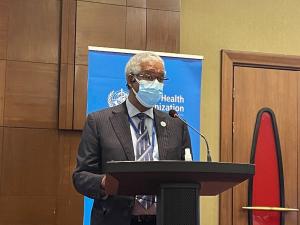A healthy planet requires sustainable actions
Op-ed - The effects of climate change are clear and already being felt around the world. Occurrences such as heat and cold waves, floods, droughts, hurricanes, storms, and other extreme weather events have a direct impact on health. They cause injuries, heart attacks, trauma, and infectious diseases.
WHO estimates that more than 13 million deaths around the world each year are caused by avoidable environmental causes. Air pollution from burning fossil fuels kills 13 people every minute from lung cancer, heart disease, and stroke.
99% of people breathe unhealthy air resulting from the burning of fossil fuels. And 9 out of 10 people breathe polluted air which kills 7 million people every year.
Moreover, climate change severely undermines the achievement of Universal Health Coverage (UHC) in several ways - including increasing the existing burden of disease and barriers to accessing health services, often at a time when they are most needed.
On top of this, a heating world is seeing mosquitos spread diseases further and faster than ever before, with serious consequences for African countries which reported 94% of the 229 million malaria cases recorded globally in 2019.
Effective sustainable measures are needed to reverse and limit the effect of climate change on the world.
If we are to save our planet, we must work together to strengthen our efforts to combat actions that contribute to ozone depletion and increased pollution and global warming.
I commend the Government of Uganda for adopting the COP26 commitments on health and climate change in November 2021. Through these commitments, Uganda committed to strengthening its health system to be resilient to the impacts of climate change; developing a health adaptation plan informed by a health vulnerability and adaptation assessment; developing the health system to be sustainable and low-carbon; and increasing climate change-related health financing.
The Fifth Session of the United Nations Environment Assembly (UNEA-5), held in March 2022, in Nairobi, Kenya, adopted a resolution to pave the way for a legally binding global treaty by 2024 to end plastic pollution. Efforts must be put in place to ensure this treaty is domesticated and implemented.
With Africa’s population projected to grow to 2.5 billion by 2050, we can expect burgeoning urbanization into areas exposed to natural hazards, and a concomitant increase in associated injuries, diseases, and deaths. As such, The WHO Regional Director for Africa, Dr Matshidiso Moeti, urges Member States to urgently initiate adaptation and mitigation actions.
For over 25 years, WHO's approach has focused on building national capacities and improving the resilience and adaptive capacity of health systems to cope with the adverse health effects of climate change. WHO's technical support to the Member States ranges from specific topics to more programmatic approaches for countries implementing climate change and health projects.
In addition to existing actions, there is a need to restructure the food production, packaging and distribution system to make it more sustainable, which would help mitigate climate impacts and promote more nutritious diets that could prevent nearly 11 million premature deaths per year.
Faced with transportation, which produces about 20 percent of global carbon emissions, alternatives such as walking and biking are not only environmentally friendly, but they also offer major health benefits through reduced risk of many chronic diseases and improved mental health.
In addition, we need to plant trees to fill the void created by deforestation.
The allocation of funds for the implementation of public health projects must take into account the environmental aspect to protect the planet and the lives of people.
If we want a healthy planet for future generations, we must make it sustainable and livable.
The author of this Op-ed is Dr. Yonas Tegegn Woldemariam, The WHO Representative to Uganda.
